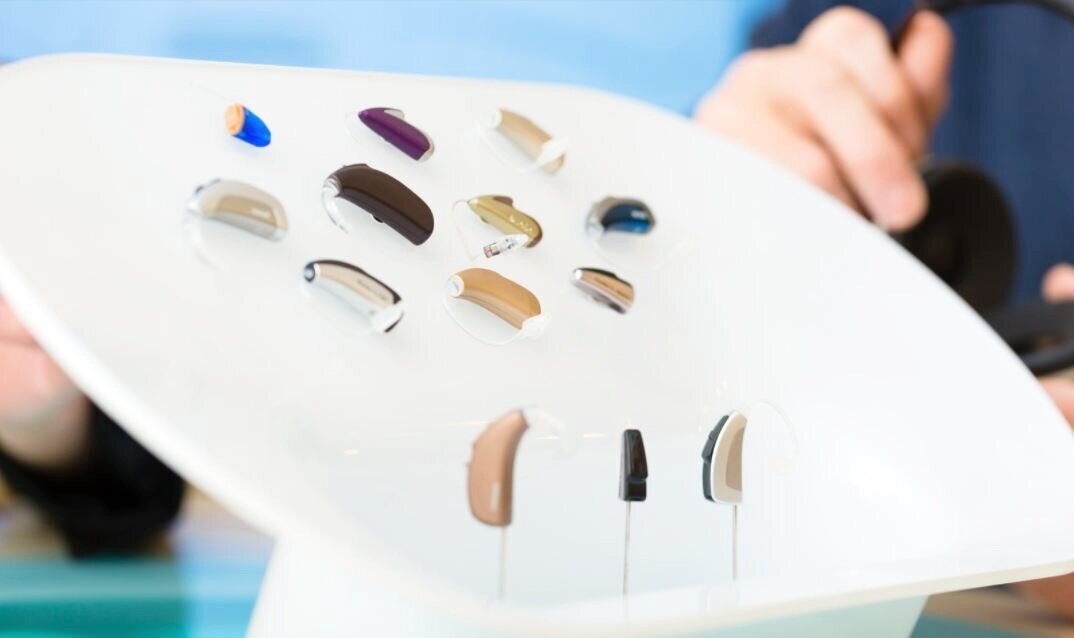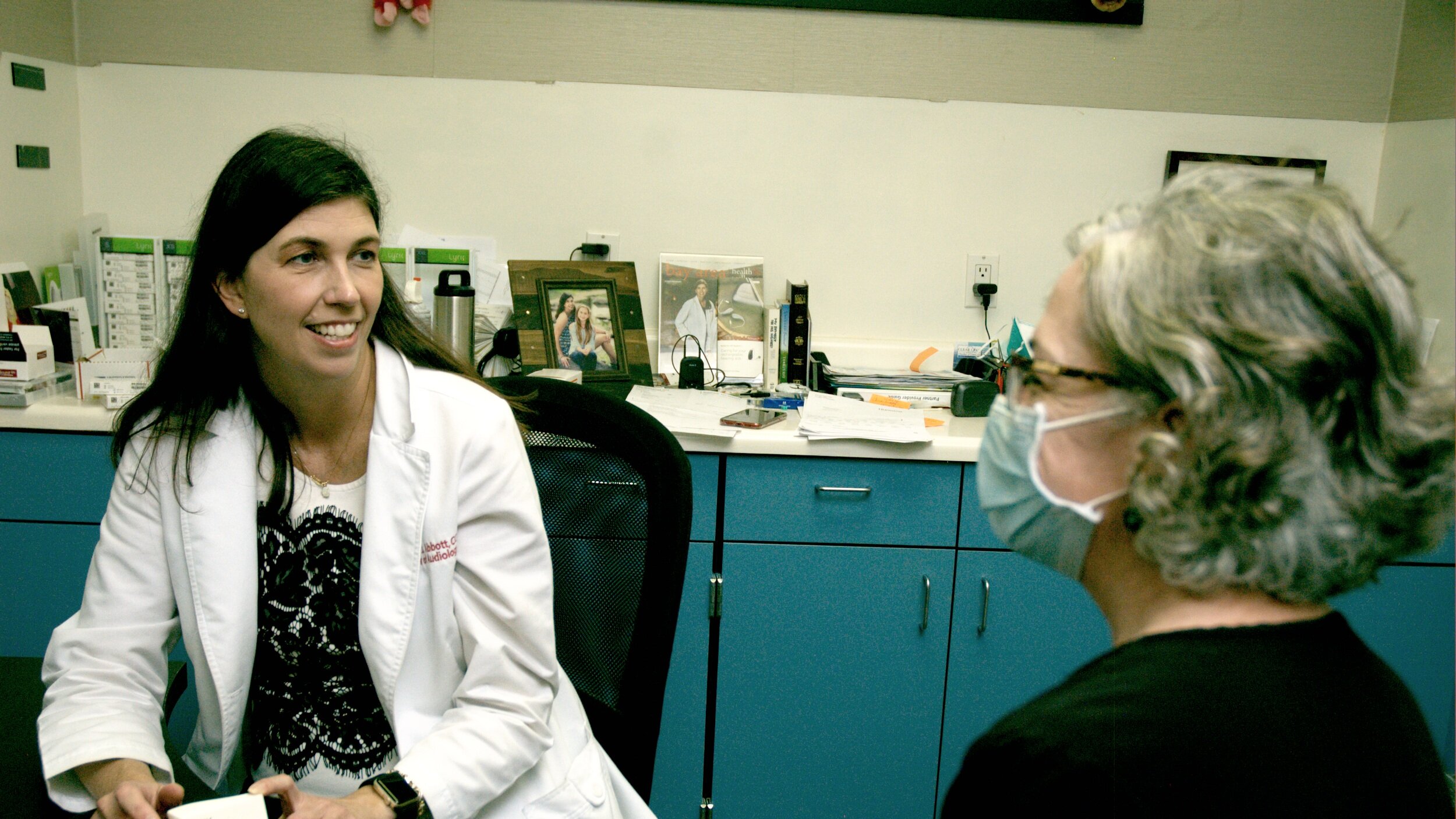
Hearing
Hearing Tests, Hearing Aids, Tinnitus, Custom Ear Protection
WHAT ARE SOME SIGNS OF HEARING LOSS?
What other people are saying can be heard, but not actually understood.
It sounds like other people are mumbling when they talk.
Difficulty hearing conversations in group settings.
Needing to ask someone to repeat what they just said, often more than once.
Difficulty understanding words and conversations on the telephone.
Radio/TV are consistently played at extremely high volume, causing complaints by others.
Constant ringing sound in the ears (tinnitus).

Hearing Loss FAQs
HOW MANY PEOPLE HAVE HEARING LOSS?
Hearing loss is the third most common health problem in the United States. According to the National Institute on Deafness and Other Communication Disorders (NIDCD), more than 36 million Americans have some type of hearing problem, and 30-40% percent of people over age 65 have hearing loss. Approximately 90% of those suffering from hearing loss can be helped by the use of hearing aids.
WHAT ARE SOME OTHER MEDICAL ILLNESSES RELATED TO HEARING LOSS?
There are a number of different causes for hearing loss. Depending on what other symptoms are associated with the hearing loss, such as tinnitus (noise in the ears), dizziness, imbalance, ear pain, ear infection, trauma, family history of hearing loss, the cause may include but is not limited to: infection, tumor, stroke, diabetes, neurological disease, autoimmune disorder, drug toxicity, various forms of trauma.
WHAT CAUSES HEARING LOSS?
In the inner ear, there are thousands of hair cells that allow us to hear by detecting different frequencies, stimulating the auditory nerve, and sending sound signals to the brain. In 90% of all hearing loss cases, these hair cells are damaged, meaning that the brain is not receiving all of the sound needed to form a complete auditory soundtrack. The damage of those hair cells may result from trauma, disease, noise exposure, aging, or be hereditary in nature.
CAN I LIVE WITH HEARING LOSS?
Sensorineural hearing loss is particularly problematic because it usually develops gradually. As hearing loss continues unnoticed, eventually sounds that are critical to communication become compromised. Over extended periods of time, the brain will become accustomed to not hearing those sounds, meaning that it will take longer for the brain to understand those sounds again. Many people dismiss or ignore their hearing loss, sometimes for years — this is a bad decision, because putting off the inevitable only makes it more difficult to rectify the problem. Regular hearing aid use helps maintain the brain’s ability to interpret sounds, increases communication, and improves the user’s quality of life.

HEARING TESTS
Our audiologists perform comprehensive hearing examinations in a high-tech sound-treated booth to ensure accurate testing results. Testing options are also available for young children who may not be able to cooperate with a traditional hearing examination.
Hearing Aids
Both Dr. Abbott and Dr. Greiner prescribe and fit hearing aids through Bay Area Audiology which is conveniently located within the Clear Lake Medical Center ENT medical practice. Having received doctoral-level training to fit and dispense hearing aids, our audiologists fit hearing aids personally to achieve superior comfort and maximum hearing improvement.
WHAT ARE THE DIFFERENT TYPES OF HEARING AIDS?
There are several different types of hearing aids available, ranging from types that are completely in the ear canal and not outwardly visible to more powerful behind-the-ear types. Our audiologists will assist you in determining which aid is right for you based on the nature and extent of your hearing loss as well as your unique lifestyle needs.
Completely in the Canal: For mild to moderate hearing loss, and not outwardly visible.
In the Ear: For mild to severe hearing loss, the largest of custom hearing aids.
Open Ear: For hearing loss in the high frequency region but normal hearing in the low-frequency region. It’s comprised of a small case which sits behind the ear, with a thin tube that goes into the ear.
Behind the Ear: For mild to profound hearing loss, using a traditional custom ear mold.
DO YOU PROVIDE MAINTENANCE AND REPAIR SERVICES FOR HEARING AIDS?
In addition to fitting hearing aids, our audiologists provide hearing aid maintenance services, repairs, and cleanings. They also dispense batteries, battery cases, Dri-Kits, electric dry kits, dry kit desiccants, and other supplies to care for and maintain hearing aids.
Our audiologists can also program and repair many different models and brands of hearing aid devices. If you purchased your hearing aids elsewhere and they need care or programming, please contact our office with the make and model of your device. One of our audiologists will let you know if they are capable of servicing or programming your aid.

WHAT BRANDS OF HEARING AIDS DO YOU CARRY?
Our audiologists fit hearing aids manufactured by GN ReSound, Phonak, Lyric, and Widex.
TINNITUS THERAPY
Tinnitus describes the presence of sound heard in the ear(s) that does not exist in the external world. Nearly 36 million Americans suffer from tinnitus. Different types of tinnitus include ringing, buzzing, roaring, humming, machine like whirring, chirping, pulsatile, and even music. It is often more noticeable in a quiet environment or in settings of increased anxiety or stress. Diet and medicines may also influence tinnitus as caffeine, spicy foods, aspirin, and quinine may worsen tinnitus.
Sometimes tinnitus is associated with hearing loss. It is believed that the neurological pathway of hearing becomes affected. Either false signals are sent to the brain or signals are produced by the brain itself in response to the absence of hearing and stimulation at certain frequencies.
In many cases, however, the cause of tinnitus is unknown. Treatment is largely aimed at minimizing the effects of tinnitus. Aside from maintaining good physical and mental health, the management of tinnitus involves the technique of masking – using other sounds to distract the mind from the tinnitus. Our audiologists can provide a tinnitus evaluation and fit Combination Devices that not only treat hearing loss but also help manage tinnitus.
CUSTOM EAR & HEARING PROTECTION
Exposure to loud noise is the most common cause of hearing loss. As a general rule, if you have to shout over a noise to make yourself heard, if the noise hurts your ears or makes your ears ring, or if you have difficulty hearing for hours after exposure to the noise, the noise is probably at a damaging level. The longer you are exposed to an intense noise and the closer you are to its source, the more damaging it is. A single exposure to an intense noise 120 decibels or greater can result in permanently damaged hearing. Prolonged exposure to noise 85 decibels or greater can also permanently damage hearing. Hearing protection devices (HPDs) should be worn when working in noisy environments, using power tools, yard equipment, or firearms, or when riding vehicles such as motorcycles and snowmobiles.
Standard earplugs and earmuffs can protect your hearing if they are fitted correctly. However, custom earplugs are usually more comfortable and provide better hearing protection. If you have any questions about hearing protection, our audiologists will counsel you about appropriate hearing protection and can make earplugs that are customized for your needs. Take no chances with intense noise — the damage it causes to hearing can be (and frequently is) permanent!
Our audiologists provide custom fit ear plugs and hearing protection products by Westone. We have options for a variety of activities and occupations including swimming, hunting and shooting, playing music, flying planes, riding motorcycles, or any other activity involving exposure to noise intense enough to damage ears or hearing.





